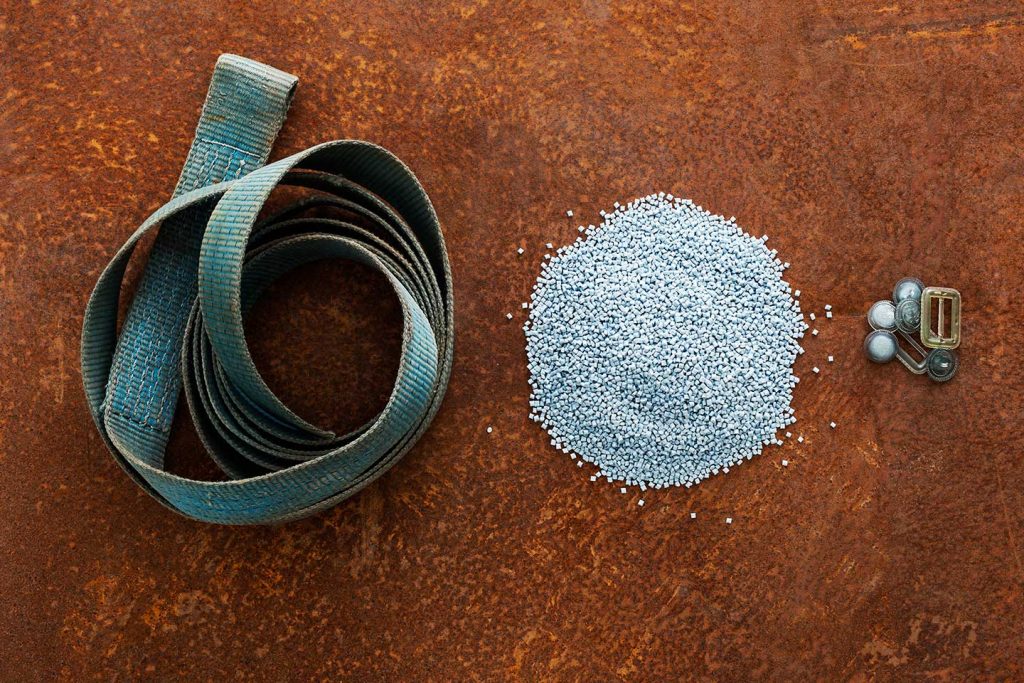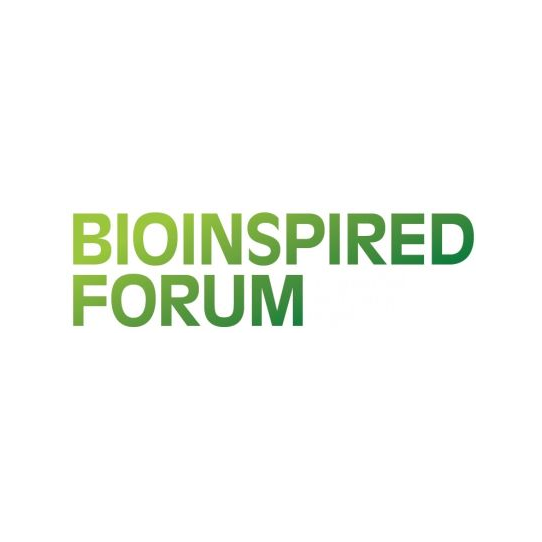From Waste to Fashion – Giving New Life to Industrial Polyester
Worn-out straps and round slings for transport and heavy lifting might seem a world away from fashion, but the two industries have one thing in common: the use of virgin polyester as a key material. Together with Axel Johnson International and Filippa K, Axfoundation set out to give this industrial polyester waste new life as a recycled fashion material. Though promising findings were made, systemic challenges ultimately hindered the scaling of the solution from pilot to circular business model. This is what we learned along the way.

Instead of burning straps consisting of 100 percent polyester, they can be turned into PET pellets used in for examples buttons.
The Issue
Plastic pollution is one of the most pressing environmental challenges of today. In Sweden alone, only 10% of the plastics are recycled. Every year, over 3,300 tons of polyester transportation and lifting products from the industry group Axel Johnson International enter the global market. The products are made from high-strength industrial polyester to endure heavy lifts and security. However, the lifetime of these products is short, and they are only used once or a couple of times before they get discarded due to logistics, safety or insurance reasons.
Although incentives to utilize these used products are low, there is an increasing demand for recycled polyester from the fashion and textile industry. Today, companies are heavily dependent on virgin plastics, with polyester dominating the market at 51.5 per cent of the total global fiber production.
Due to the significant volumes of discarded polyester and an increasing demand for recycled polyester in fashion, we could see great potential in a large-scale circular model.
– Hanna Hobohm Skoog, Programme Director, Future Materials, Axfoundation
About plastics and polyester
- The linear production, use and disposal impose severely negative impacts on society and the environment. In a report from 2021, WWF concludes that the cost of plastic to the environment and society is at least 10 times higher than the market price paid by primary plastics producers.
- The low price of virgin polyester together with the challenges of recycling these strong materials with today’s conventional methods, the incentives to utilize the used products are low.
Our Solution
In the project From Waste to Fashion, the goal was to develop a new ecosystem for industrial polyester, finding ways to recycle industrial polyester waste and turn it into input material for the fashion industry, and ultimately, other sectors. The aim was to enable a reduction of waste from polyester transportation and lifting products as well as reduce the use of virgin polyester in fashion. The project was active between 2018 and 2021.
Our Work
Firstly, Axfoundation mapped the demand for recycled polyester among Swedish fashion and outdoor brands to better understand the companies’ processes of sourcing recycled polyester and their thoughts on the future of materials.
After validating the demand for an alternative feedstock for recycled polyester, the next step was to evaluate the recyclability of the feedstock. The textile used for the transportation and lifting products at Axel Johnson International, is made from 100% high-strength industrial polyester and the used products are often contaminated with oil and dirt. The project evaluated different methods for both mechanical and chemical recycling.
Finally, the project decided to participate in the ‘Smart Loops’ research project. This research project, led by IVL, aimed to evaluate whether it is possible to have a specific collection and get smaller, but cleaner material streams, so-called “Smart loops” in Sweden. The results from the research project can be found here.
Results
The interviewed fashion and outdoor brands showed a big interest in the project and its future results. A common denominator was the need to find new feedstocks for recycled polyester beyond PET bottles.
The project developed a successful proof-of-concept with Filippa K and their trim supplier in 2018: Industrial polyester waste was made into prototype buttons and buckles through a process of mechanic recycling. The material was also evaluated by the Hong Kong Research Institute of Apparel and Fashion to examine the potential for fiber-to-fiber recycling.
In parallel with the tests of mechanical recycling, the project also participated in a RISE initiative, testing chemically recycling of polyester transportation and lifting products by depolymerization. Contaminated transportation and lifting products were successfully recycled, on small scale, to virgin quality PET. An early Life Cycle Analysis also suggested that the recycled PET had a 72 % lower CO₂ impact than virgin polyester.
The business modelling showed that the volumes of polyester products distributed every year by Axel Johnson International’s companies alone equal three percent of the consumer plastic packages collected in Sweden yearly. The financial loss from not utilizing these materials was estimated at 13 – 28 million SEK. From an environmental point of view, the analysis concluded that 5.2 tons of CO₂e would be saved per ton if virgin polyester would be replaced by recycled polyester.
Our waste materials had several interested buyers, but a lack of large-scale, practical and economically feasible pre-treatment and recycling solutions made it difficult.
– Hanna Hobohm Skoog, Programme Director Future Materials, Axfoundation
As a result of the project’s business modeling, Axfoundation reached out to several key downstream actors in logistics and recycling to team up to collect and prepare the waste materials for recycling. Unfortunately, these dialogues did not move forward since the volumes were considered too small for them to be profitable to recycle.
In the first phase, the project showed the potential for industrial polyester to be recycled and become a resource in an apparel value chain. But in the second phase, systemic challenges related to the availability of large-scale recycling technologies suitable for high strength and contaminated industrial polyester, reverse logistics, partnerships, and the right market conditions hindered the scaling of the solution.
The challenges along the way inspired insights and lessons as to what hinders plastic recycling on a major scale. Read more on the results, learnings, challenges and the step-by-step approach, in Axfoundation’s report “From Waste to Fashion”.
Why did it fail?
One initial insight that was drawn in the project, was that the waste streams of these industrial polyester products occur irregularly, in small volumes, and in countless geographical locations. The condition of the materials also varies greatly which requires pre-treatment before recycling.
Secondly, today’s recycling manufacturers are not set up to handle different types of products and can only process a few different plastics with even quality and volume. The volumes need to be significant to be financially justified for recyclers to be interested.
Thirdly, there is a need for increased traceability and access to digital data regarding the composition and recyclability of goods so that users across the value chain more easily can reuse them or treat them correctly at recycling facilities.
What did we learn?
During the project, five factors were identified that must be in place to enable a circular business model for polyester:
- Innovation and upscaling of recycling techniques
- Sustainable solutions for reverse logistics
- Increased transparency about the composition and origin of the materials
- Partnership and the possibility of collaboration across sectors
- The right market conditions for secondary materials
At the time of writing, Axfoundation’s project From Waste to Fashion is resting. However, new promising dialogues have been initiated with new partners, bringing new possibilities to the table. Great systematic changes often happen where you least expect them.
































